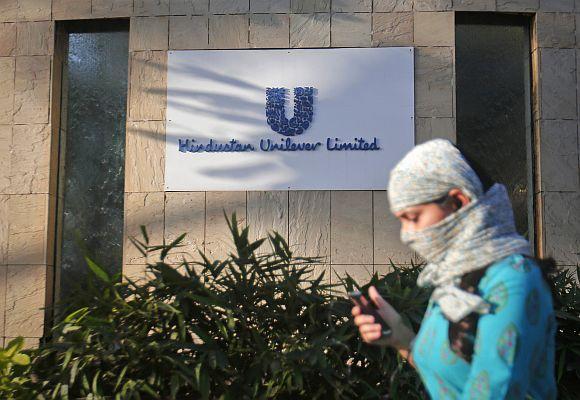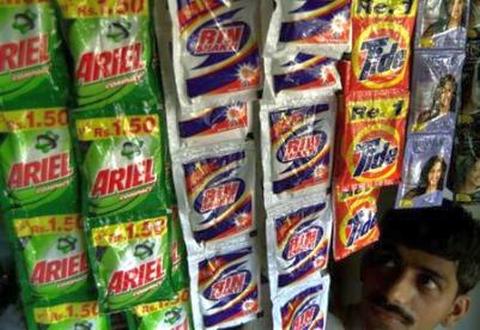Photographs: Danish Siddiqui/Reuters Business Standard in New Delhi
It borrowed cheaply in the West and now investing in high-earnings assets in India.
The open offer by Unilever to raise its stake in its subsidiary Hindustan Unilever (HUL) to 75 per cent virtually amounts to undoing what the government had done to foreign companies operating in India four decades ago.
Indira Gandhi's government had introduced the Foreign Exchange Regulation Act (Fera) to force companies to substantially reduce their foreign equity and subject them to a host of regulatory controls.
Though regressive, the Fera rules forced dilution of foreign shareholding in a large number of companies, including Hindustan Lever as it was known then, and gave a boost to India's primary capital market - a move that also helped Indian shareholders participate in the amazing success stories of many of these companies with majority foreign equity.
...
How Unilever profits from HUL open offer
Photographs: Reuters
The wheel has turned full circle, with a host of companies with majority foreign equity now seeking to delist from India or raising their stake to well beyond majority.
Unilever has said it has no intention of delisting in India and the decision is aimed at participating more in the India growth story.
However, the question will linger, since many other MNC subsidiaries have taken that route in the past.
Many say Unilever's denial cannot be taken at face value given the stake involved here. India is now Unilever's third-largest market, and may go up a notch soon.
...
How Unilever profits from HUL open offer
Image: A pedestrian walks past the Hindustan Unilever Limited headquarters in Mumbai.Photographs: Danish Siddiqui/Reuters
Secondly, consider Unilever's financial environment. Thanks to the developed countries' expansionary monetary policy, interest rates there are at historical lows.
Top-rated companies can borrow at relatively low rates of interest, and invest in high-earnings assets in emerging markets to book arbitrage gains.
This is especially true of Unilever, which in August 2012 raised $1 billion in the US in two tranches, through a five-year bond at an average coupon rate of 0.65 per cent.
In comparison, HUL's dividend yield works out to be 3 per cent at Unilever's offer price of Rs 600 per share. The calculation is based on the assumption that HUL distributes its entire net profit as equity dividends.
...
How Unilever profits from HUL open offer
Image: A salesman carries items in a basket inside a family-run grocery store in New Delhi.Photographs: Mansi Thapliyal/Reuters
In the last five years, HUL has on average distributed around 70 per cent of its net profit as equity dividends, growing at a compounded annual rate of 14.5 per cent.
At this pace, the yield on Unilever's current investment in HUL would grow to 5.9 per cent in five years and 11.7 per cent in 10 years. It could be even higher if the rupee appreciates.
This gap between Unilever's cost of capital and yield on its HUL equity is certainly one way Unilever can deliver market-beating returns to its shareholders, given the steady decline in its financial ratios of late as its home markets grow sluggishly.
However, the open offer is not a bad deal for HUL's shareholders in India, given the high interest rate in India and the high offer price.
...
How Unilever profits from HUL open offer
Image: An Indian shopkeeper arranges small packets of detergent powder and shampoo in his shop in MumbaiPhotographs: Punit Paranjpe/Reuters
Why, however, should anyone give up holdings in a company that has given returns on equity of 93 per cent?
For the Indian market, delisting or reduction in the free float of HUL would be a great potential loss to the Indian equity market and investors.
Despite losing some ground to its competitors in recent years, HUL remains the largest and most important consumer goods company of its kind in India. It remains a must-have stock in most portfolios that wish to gain from the India growth story.







article